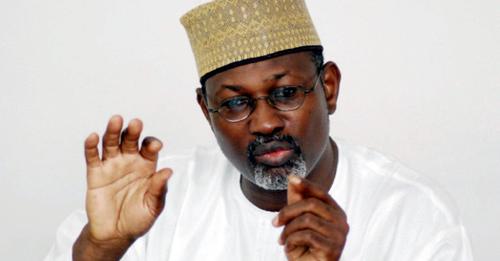Headlines
Why the President should not be allowed to nominate the head of INEC – Jega

Prof. Attahiru Jega, a former chairman of the Independent National Electoral Commission (INEC), has requested that the Electoral Act, 2022, be amended to prevent the President from nominating the chief executive of the Commission.
Although the nation’s electoral legislation might be regarded as the best in Nigeria’s history, he claimed that it is not flawless and that additional revisions are required to clear up any confusion, make certain provisions clearer, and reinforce others.
Jega gave a speech during a retreat that the National Institute for Legislative and Democratic Studies (NILDS) hosted for senators over two days in Ikot Ekpene, Akwa Ibom State.
He asserted that the changes should mandate electronic results transmission starting with the 2027 general elections.
In order to remove partisanship from INEC, he added, the president should relinquish his authority to name the commission’s chairman and national commissioners.
According to him, the law needs to be modified to make sure that any disputes resulting from the conduct of the elections are settled and decisions are rendered prior to the date of swearing-in.
Jega argued that section 64 of the Electoral Act, which outlines the transmission of election results, should be clarified by requiring election results transmission, including uploading of results at the polling unit level and result sheets used at various levels of result collation.
If the Act is revised early enough in the upcoming electoral cycle, INEC would have ample time to prepare for this, he said.
Additionally, he urged for the introduction of early voting for qualified voters serving on election duty, such as INEC employees, observers and their drivers, security officials, and journalists, as well as the creation of special arrangements to allow them to cast ballots on election day, particularly for presidential elections.
READ ALSO: Bayelsa APC Governor Candidate: INEC Awaiting Final Decision – Spokesman
In order to allow citizens to vote, particularly those providing vital services abroad, the former INEC head argued for diaspora voting, at least for presidential elections.
He said that there was a need to increase the representation of women, up to 35% of elected positions in the legislature, and in the candidate lists of all political parties.
Other changes
Jega argued that cross-running by elected officials should be prohibited not only for members of the National Assembly but also for elected executives, governors, and chairmen of LGAs. Once INEC has proof of the act of cross-running, it should be given the authority to prepare for elections to fill the vacancy.
“Strict conditions must be set for candidate withdrawal and replacement to prevent abuse,” he stated. Give INEC the authority to screen candidates and, if necessary, disqualify them if their qualifications are insufficient or if it has reason to suspect fraud or other illegal activity on their part.
“The law needs to permit lawsuits against candidates who give INEC incorrect information about their candidature from both tax-paying people and candidates outside of political parties.
“Although Sections 132(8) & (9) have set deadlines for the Tribunals and courts of appellate jurisdiction to produce rulings, it is important to make sure that all disputes are settled and decisions are rendered prior to the date of swearing-in, especially in regards to elected executive positions.
Review the INEC selection procedure, with a focus on reducing or eliminating the president’s role in selecting the organization’s chairman and national commissioners, in order to rid the commission of the detrimental misconception that “he who pays the piper dictates the tune”
“The Justice Uwais Committee suggested that the National Judicial Council (NJC) be given the duty of advertising, screening, shortlisting, and submitting to Council of State for recommendation to Senate for confirmation hearings, for this category of officers.
“On second thinking, and for obvious reasons, I shall advise that a joint committee of the National Assembly be given this role, along with a criteria, for transparency, non-partisanship, and stakeholder participation for the process. The candidates/nominees for these jobs should be held accountable to the public for their qualifications, including their knowledge, abilities, moral character, and impartiality. During this procedure, there should be guidelines for presenting petitions against any nomination.
